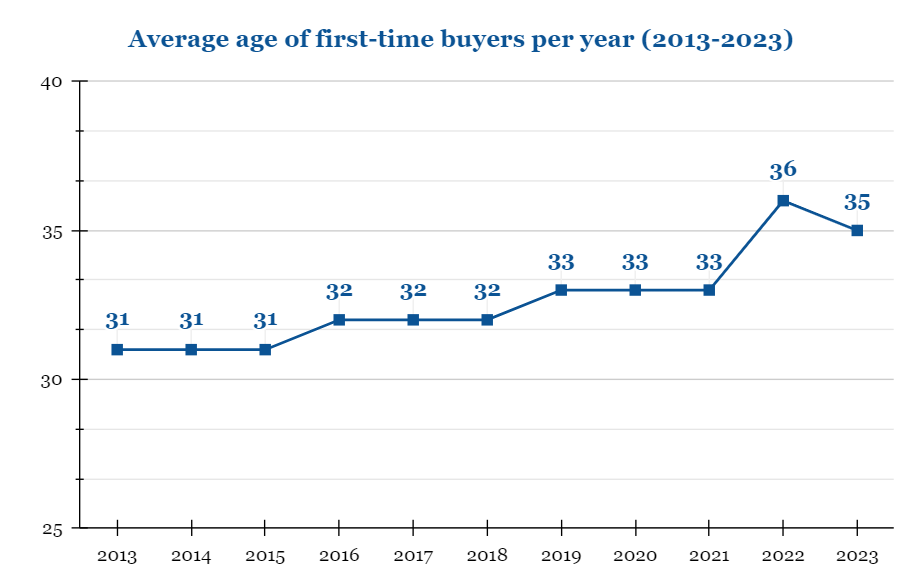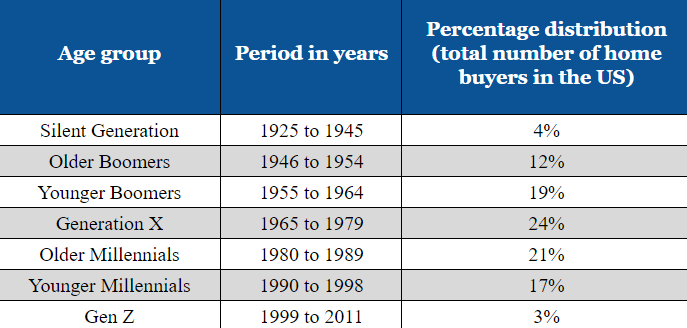Since homeownership is a dream for many in the US, have you ever wondered at what age do most Americans buy a house? Find out in this article

With every generation, people in the United States share a common goal especially when they reach adulthood: buying their first home. This begs the question about the appropriate age when Americans are supposed to be homeowners. What’s the average age to buy their first home?
The average age for property buyers to purchase their first home is the defining element in answering these questions. In this article, Mortgage Professional America will discuss not only the average age but also the key factors that influence it. We will also explore the demographics of first-time home buyers and the age group that owns the most homes in the US.
For our usual pool of readers, this is part of our client education series. We encourage you to pass this along to clients who might be interested in learning the average age of most Americans when buying their first home.
What’s the average age to buy your first home?
The average age of first-time home buyers in the US is 35 years old, according to the National Association of Realtors (NAR). It is one year less than the previous record (36 years old) and four years more than the average age of first-time buyers in the past decade (31 years old).
Factors influencing the age of home buyers
There are many factors that influence how the average age to buy one’s first home is determined. Some of them are:
- income and savings
- job and career stability
- marital and family status
- home prices and mortgage rates
- lifestyle, goals, and preferences
- downpayment assistance programs
Let’s check each one to examine why these factors greatly impact the average age of Americans when buying their first home.
1. Income and savings
Younger home buyers often have lower incomes and less accumulated savings. This makes it more difficult for them to afford a deposit and qualify for a mortgage loan. As their salaries rise and savings grow over time, older home buyers typically have more financial resources to put towards buying their first property.
2. Job and career stability
It isn’t always the case, but most young professionals might have a shorter job history and less income stability. Because of this, mortgage lenders tend to be more cautious about approving their home loan applications. Those who are more established and with steady jobs can be seen as having lower risks. Good earning histories might also play a vital role in securing better mortgage offerings.
3. Marital and family status
People who are single tend to buy homes at a later age compared to married couples or those in committed relationships. Property buyers with children often purchase a home at a younger age to provide for their family. This is driven by the need for a bigger space to accommodate the number of household members.
4. Home prices and mortgage rates
Rising home prices and fluctuating mortgage rates make it increasingly challenging for first-time buyers to afford a home. In areas where properties are expensive, home buyers are usually older as it takes more time to increase their credits scores and save for a deposit.
Mortgage rates are also uncontrollable, adding extra pressure to aspiring property owners. However, other buyers are being creative. They are improvising to make their mortgage repayments lighter.
Watch this video on how some home buyers are finding creative ways to pay lower mortgage rates:
If you think that this is the right time for you to buy your first home, hiring a mortgage broker is of the utmost importance. You can find the best mortgage professionals in the country when you check out our Best in Mortgage page.
5. Lifestyle, goals, and preferences
Those who are young and inexperienced are more likely to prioritize flexibility and mobility over homeownership. They might wait until they are more settled in their careers and relationships. Older buyers often desire the space, stability, and investment opportunity that comes with homeownership.
6. Downpayment assistance programs
First-time home buyer programs that help with deposits and fees like closing costs can make homeownership more accessible to younger, lower-income buyers. The presence and awareness of these housing schemes can influence the average age of buyers in the real estate market.
Government programs and incentives when buying your first home
To help first-time home buyers, the government is offering several housing loan assistance programs and first-time homeownership schemes. Below are three examples:
- employer-sponsored programs
- first-time home buyer tax credit
- closing cost assistance programs
Read next: Estimated Closing Costs Explained: What Buyers and Sellers Need to Know
Average age to buy first home in the past decade
The average age of first-time home buyers in the US is 31 in the past decade. In 2023, 35-year-olds are typically buying their first property—a jump of four years in terms of age after 10 years. To analyze the average age in the past decade, we looked at different annual reports from NAR and compared how old first-time buyers were each year.
Below is a comparative line graph that shows the average age of first-time buyers in the US per year since 2013:

How are first-time home buyers characterized in the US?
Home buyers in the US, whether first-time or repeat buyers, are characterized by their age group. This quantifier allows NAR to determine which generation owns the most properties in the country. This also enables them to find out the age group that comprises most of the home sellers.
Here are some of the other characteristics that NAR used to analyze American home buyers aside from their age groups:
- gender
- education
- race or ethnicity
- primary language spoken
- prior living arrangements
What age group is most likely to buy a home?
The Millennial age group makes up the largest generational group of home buyers in the country. They share about 38% of all American home buyers. To break it down, 21% are Older Millennials while 17% belong to the Younger Millennial age group.
Check out the other generational age groups’ share in this table below:

Seeing as Gen Zers are at the lowest, check out this video on how Gen Z could use a concept called the "Silver Tsunami" by real estate experts to beat Millennials in the housing market:
Most common reasons why home buyers are purchasing a home
Two of the most common reasons why home buyers are purchasing homes are:
- the goal of having a home of their own
- to be closer to family, relatives, and friends
The first reason is a no-brainer. NAR reported that for all home buyers under the age of 59, their reason for purchasing is the desire to be a homeowner. The second reason is not only for first-time home buyers but also for those who sold their initial homes and bought another residential property.
Buying a home for investment and to earn a passive income
For those who are on the upper end of the income ladder, purchasing property has become an increasingly popular way to create wealth. Property enthusiasts usually buy rental properties to generate cashflow. The value of rental income has increased due in part to low interest rates.
Because of its investment potential, buying a home makes sense if several factors weigh in your favor, including:
- having minimal debt or none at all
- having a good credit score
- having a solid, reliable and well-paying job
- having established an emergency fund
Why are first-time home buyers getting older?
First-time home buyers are getting older due to many reasons. A couple of these key factors are:
- housing problem all over the US
- repayment of debts and loans
Debts, primarily student loans, have also made it difficult for younger generations to save up for costly downpayments. Tightening rules around lending make bank loans even harder to get for applicants with imperfect credit scores. The age of repeat buyers has also increased dramatically since data collection began in 1981, with the typical age rising from 36 then to 58 now.
It is no surprise that the typical age of first-time home buyers is now 35 years old. That age is the oldest since data was first recorded in 1981.
Not only that, but the median age of all home buyers has also reached a new high of 47 years old. To compare, the median age in 1981 was only 31 years old. This figure has increased as generations change over time. Two main factors have also worsened the issue:
- scarcity in houses, causing more competition
- unaffordable property prices
The ever-changing mortgage rates have also made house prices out of reach for many, especially in cities along the coastal areas. This has forced a migration of home buyers into the middle of the country.
Should the average age to buy your first home matter?
The answer depends on the home buyers themselves—it is on a case-to-case basis. The average age to buy one’s first home can serve as a guide for aspiring homeowners, but not a burden. It should not pressure anyone on deciding to purchase a property in haste. It should simply be an additional barometer for the real estate market in the US and how buyers are responding as generations change.
Do you think that the average age to buy their first home affects the decision of first-time property buyers in the US? Share your insights in the comments below.



